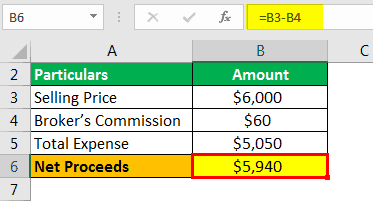Table Of Contents
Net Proceeds Definition
Net proceeds are the final amount of money that a seller is entitled to receive concerning the disposal of an asset less all the related expenses like commission, fees, etc., that are already paid, and it is calculated by deducting all the selling costs from the sale price of an asset. For example, suppose A sells his residential property to B. In that case, net proceeds shall be the funds A is entitled to receive from B after all the related costs like realtor's fees and other costs are considered.
How to Calculate Net Proceeds?
Net Proceeds can be derived by summing up all the expenses and deductions the same from the amount received as sale proceeds.
The first step in this process is to identify and sum up all the expenses that are incurred and related to the transaction. These related expenses could be the asset price, advertisement costs, realtor's fees, travel costs, etc.
In the final step, the total costs ascertained from the sale of the asset must be deducted from the full amount received due to the sale. The leftover amount is the net proceeds.
Examples
The following are examples of net proceeds.
Example #1
Mike sells his house for $60,000. The related expenses bought during the transaction are-
- Traveling costs- $50
- Advertisement costs- $500
- Realtors' fees- $3,000
Find out the net proceeds earned by Mike.
Solution
Calculation of Total Expenses

Total Expenses = Traveling Costs + Advertisement Costs + Realtor's Fees
- = $(50+500+3,000)
- = $3,550
Calculation of Net Proceeds

Net Proceeds = Sale Price - Total Expenses
- = $60,000 - $3,550
- = $56,450
Therefore, the net proceeds earned by Mike from selling his house come to $56,450.
Example #2
Jerry, an investor, bought stock worth $5,000 and paid $50 as broker’s commission. The total cost at which Mike bought the stock is $5,050 ($5,000 + $50). Mike sells the newly bought stock to Bill for $6,000 and pays $60 as the broker’s commission. Calculate the net proceeds and capital gains earned by Mike.
Solution
Calculation of Net Proceeds

The net proceeds from this transaction = Selling Price - Broker's Commission
- = $6,000 - $60
- =$5,940
Calculation of Capital Gains
The capital gains earned by Mike can be calculated by subtracting his total expenses from the amount of money he earned during the same transaction.

- = $5,940 – $5,050
- Capital Gains = $890
Thus capital gain comes to $890.
Net Proceeds vs. Gross Proceeds
The following is a difference between net vs. gross proceeds –
Net and gross proceeds must not be confused since both of these are two different terms. It is the total amount of money received from the sale of an asset after deducting all the related expenses such as the realtor's commission, fees, etc. At the same time, gross proceeds are the total amount of money received.
When a company sells any tangible or intangible asset, it receives money. This money received is termed gross profit, including all the costs and expenses associated with the production and other related expenses. On the other hand, it is the final amount of money left with the seller after bearing all the expenses and costs related to the transaction. In simple words, gross proceeds are the unprocessed amount, while net proceeds are the final amount left with the seller/owner.
Net Proceeds in Real Estate
The owner or seller of a real estate property must consider the sale price and all the related costs and expenses that are supposed to be incurred for initiating the transaction. Upon the sale of a real estate property, the seller must record its sale price amount on the credit side since this is the amount the seller receives. Prepaid property taxes must also be credited. The debit side will reflect costs and expenses associated with the sale of homes since the same is charged against the asset's sale price.
Few other costs are supposed to be reflected on the debit side. E.g., Escrow handling fees, outstanding mortgage, pest inspection costs, excise taxes, transfer fees, home warranty, homeowner association fees, repairs, roof inspection, etc. The total debts must be determined by summing up all the items reflected on the debit side, and the same must be deducted from the total credit to obtain it for the seller from real estate.
The owner can sum up all the costs they have incurred for executing the transaction, including traveling expenses, advertisement expenses, real estate agent fees, and other related expenses. They can reduce the same from the actual amount of money they receive from the transaction. The leftover amount shall be regarded as the net proceeds earned by them from selling their real estate property.
Net Proceeds in Capital Gains Taxes
The net proceeds from the sale of assets are reflected in the corporate or individual accounts. Taxpayers are supposed to pay various types of taxes to the federal government concerning the capital gains earned on an asset. To obtain the capital loss or gains on an asset, one must pay a basic amount for acquiring the asset.
Conclusion
Net proceeds are the total consideration less all the related costs and expenses that the owner or seller of an asset receives. When a house is put for sale, the success fee is the very first cost that is subtracted from the money that is received. This fee is paid to the realtor or real estate agent for successfully selling the house to the buyer.
It holds different meanings for different sectors. In the commerce field, it is merely a profit earned from the sale of products and services after all the related costs like realtor's fees, etc., are considered. Similarly, net proceeds in the stock market are the money earned from making bonds, shares, etc., that are available for sale after all the related costs are settled and paid.


